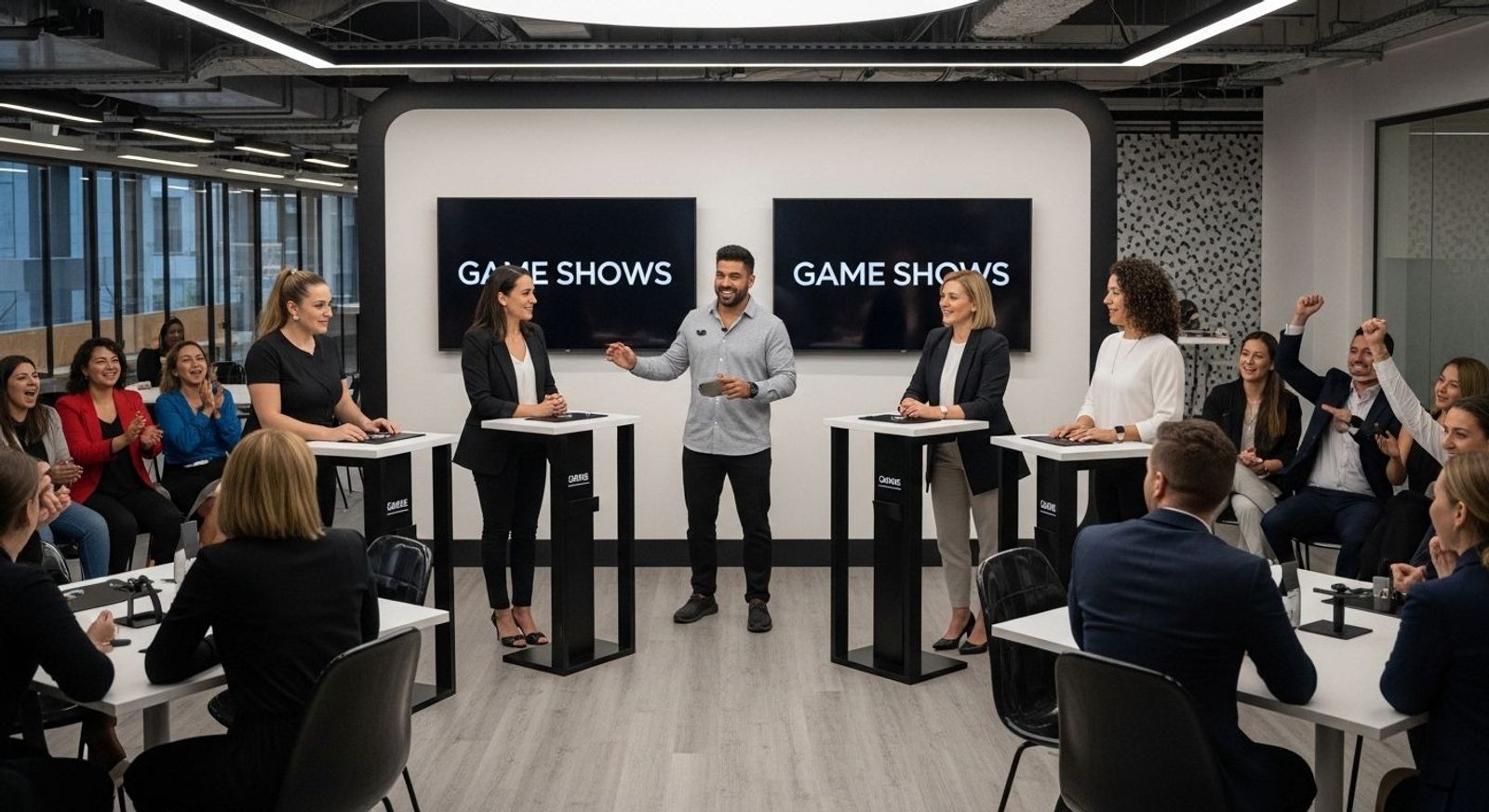Professional Bar Trivia SoftwareFor Venues & Events
- Players join via QR code — no app download
- 6 round types: Buzzer Race, Everyone Answers & more
- Rich media questions with images, video & audio
- Real-time scoring & leaderboards on the big screen
Understanding Why Use Game Shows for Engagement and Learning
September 22, 2025

Game shows might seem like lighthearted TV fun, but their real influence goes deep into how we learn and work together. Turns out, game-based learning programs can dramatically improve psychological well-being and knowledge retention according to recent research. What surprises most people is that companies now use these same game show principles to train employees, build stronger teams, and spark real engagement.
Table of Contents Defining Game Shows And Their Appeal The Fundamental Structure Of Game Shows Psychological Drivers Of Game Show Appeal The Psychological Benefits Of Game-Based Learning Cognitive Development Through Interactive Experiences Emotional And Motivational Mechanisms How Game Shows Foster Team Collaboration And Communication Communication Skill Development Through Competitive Scenarios Collaborative Problem-Solving Mechanics Applying Game Show Concepts In Corporate Settings Strategic Implementation Of Game Show Dynamics Key Organizational Application Strategies Real-World Examples Of Game Shows Boosting Team Morale Corporate Training And Engagement Scenarios Measurable Impact On Team Performance
Quick Summary
| Takeaway | Explanation |
|---|---|
| Game shows enhance active learning. | They provide a structured, engaging way for participants to learn and retain knowledge through competition and interaction. |
| Psychological principles drive engagement. | Elements like competitive motivation, immediate feedback, and social recognition keep participants invested in their learning experiences. |
| Team collaboration is improved through competition. | Game shows require clear communication and strategic teamwork, which are essential skills in professional settings. |
| Game show formats can transform corporate training. | Integrating competition and engagement in training fosters a dynamic learning environment that increases retention and job performance. |
| Structured environments promote emotional safety. | Playful and competitive settings help reduce anxiety, encouraging open communication and collaborative problem-solving among team members. |
Defining Game Shows and Their Appeal
Game shows represent a dynamic form of interactive entertainment that transforms traditional learning and engagement methods. At their core, these experiences blend competition, knowledge testing, and immersive participation into a structured yet exciting format. Learn more about interactive game experiences that can revolutionize team dynamics.
The Fundamental Structure of Game Shows
A game show typically involves participants competing to answer questions or complete challenges within specific rules and time constraints. These structured formats create an environment where learning becomes enjoyable and participants are motivated by potential rewards, recognition, and the thrill of competition. According to research from the Journal of Education and Educational Development, game shows inherently tap into psychological principles of engagement by creating scenarios that stimulate both intellectual curiosity and emotional excitement.
Psychological Drivers of Game Show Appeal
The appeal of game shows extends beyond mere entertainment. They leverage several psychological mechanisms that make learning and participation compelling:
- Competitive Motivation: Participants are driven to perform better than their peers
- Immediate Feedback: Instant scoring and response evaluation create a sense of progress
- Social Recognition: Performing well provides a platform for public acknowledgment
These elements combine to transform traditional learning experiences from passive absorption to active, participatory knowledge acquisition.
The following table summarizes key psychological drivers that make game show experiences appealing and effective for engagement and learning.
| Psychological Driver | Description |
|---|---|
| Competitive Motivation | Drives participants to outperform peers and achieve success. |
| Immediate Feedback | Provides instant scoring and evaluation to boost involvement. |
| Social Recognition | Offers public acknowledgment and rewards for high performance. |
| Intrinsic Motivation | Fosters genuine self-driven interest in learning activities. |
| Reduced Performance Anxiety | Lowers barriers to participation through playful environments. |
| Positive Reinforcement | Strengthens confidence through immediate achievement recognition. |
| Game shows effectively break down complex information into digestible, memorable segments while maintaining high levels of participant interest and emotional investment. |
The Psychological Benefits of Game-Based Learning
Game-based learning represents a sophisticated approach to education and professional development that leverages interactive experiences to enhance cognitive and emotional engagement. By transforming traditional learning paradigms, this methodology taps into fundamental psychological mechanisms that promote deeper understanding and sustained motivation. Explore our team building strategies that incorporate game-based learning principles.
Cognitive Development Through Interactive Experiences
Interactive learning environments stimulate multiple cognitive processes simultaneously. According to research in the Journal of Medical Internet Research, digital game-based learning programs significantly improve psychological well-being by creating immersive scenarios that challenge participants intellectually while maintaining an enjoyable experience. These experiences activate critical thinking, problem-solving skills, and memory retention through engaging, dynamic interactions.
Emotional and Motivational Mechanisms
Game-based learning triggers powerful psychological responses that traditional learning methods often fail to achieve. The key emotional and motivational benefits include:
- Intrinsic Motivation: Participants feel genuinely interested and self-driven to learn
- Reduced Performance Anxiety: Playful environments lower psychological barriers to learning
- Positive Reinforcement: Immediate feedback and achievement recognition boost confidence
By converting learning into an enjoyable experience, game-based approaches transform psychological barriers into opportunities for growth and engagement.
 The structured yet flexible nature of these interactive experiences allows participants to explore, experiment, and learn without the fear of traditional academic judgment.
The structured yet flexible nature of these interactive experiences allows participants to explore, experiment, and learn without the fear of traditional academic judgment.
How Game Shows Foster Team Collaboration and Communication
Game shows serve as powerful tools for enhancing team dynamics by creating structured environments that naturally encourage communication, collaboration, and strategic interaction. These interactive experiences go beyond traditional team-building exercises by integrating elements of competition, shared problem-solving, and collective achievement. Discover more about effective communication strategies that can transform workplace interactions.
Communication Skill Development Through Competitive Scenarios
According to research in the International Journal of Mechanical Engineering Education, game-based learning activities can significantly improve communication competencies by creating scenarios that require clear, precise, and strategic information exchange. In game show formats, teams must collaborate effectively, articulate their thoughts quickly, and listen actively to succeed. This dynamic forces participants to develop nuanced communication skills that translate directly into professional environments.
Collaborative Problem-Solving Mechanics
Game shows create unique collaborative environments that challenge teams to work together under time constraints and competitive pressure. The key collaborative mechanisms include:
- Shared Decision Making: Teams must collectively strategize and make rapid decisions
- Role Distribution: Participants naturally assign and adapt to different team roles
- Collective Knowledge Utilization: Groups learn to leverage individual strengths for collective success
These collaborative dynamics simulate real-world workplace challenges, teaching teams how to communicate effectively, respect diverse perspectives, and work towards a common objective. By transforming learning into an engaging, competitive experience, game shows provide a compelling platform for developing sophisticated interpersonal and team-based skills.

Applying Game Show Concepts in Corporate Settings
Game show methodologies offer organizations innovative approaches to transform traditional training, engagement, and knowledge transfer processes. By reimagining corporate learning through interactive, competitive frameworks, companies can create more dynamic and compelling professional development experiences. Learn about our corporate training solutions that leverage game show principles to enhance organizational learning.
Strategic Implementation of Game Show Dynamics
According to research in the Journal of Innovation & Knowledge, gamification platforms can significantly enhance knowledge retention and job performance when carefully designed. Corporate settings can adapt game show concepts by creating structured competitive environments that encourage participation, knowledge sharing, and skill development through engaging, time-limited challenges that mirror professional scenarios.
Key Organizational Application Strategies
Successful integration of game show concepts in corporate environments requires strategic planning and thoughtful design. Critical implementation strategies include:
- Alignment with Learning Objectives: Ensure game mechanics directly support specific training goals
- Balanced Difficulty Levels: Create challenges that are engaging without being overwhelming
- Meaningful Rewards and Recognition: Design incentive structures that motivate genuine skill development
These approaches transform traditional training from passive information absorption to active, participatory learning experiences.
This table outlines characteristic features of game shows as applied to corporate training, highlighting their specific impact on professional development and team performance.
| Game Show Feature | Description | Corporate Training Impact |
|---|---|---|
| Structured Competition | Contestants follow set rules and compete in teams or individually | Boosts engagement and stimulates participation |
| Time-Limited Challenges | Tasks or questions must be completed within a specific timeframe | Encourages focus, quick thinking, and efficiency |
| Immediate Feedback | Scores and answers are evaluated and displayed instantly | Reinforces learning and drives improvement |
| Reward and Recognition | Winners receive prizes or public acknowledgment | Motivates employees and builds morale |
| Collaborative Problem-Solving | Team efforts are required to solve questions or challenges | Enhances teamwork and mutual support |
| By introducing elements of competition, immediate feedback, and collaborative problem-solving, organizations can create more engaging, memorable, and effective professional development programs that resonate with modern workforce expectations. |
Real-World Examples of Game Shows Boosting Team Morale
Game shows have emerged as powerful tools for transforming workplace dynamics, offering organizations innovative strategies to enhance team spirit, communication, and collective motivation. By introducing structured, competitive, and engaging experiences, companies can create memorable moments that transcend traditional team-building approaches. Explore strategies for building team cohesion that go beyond conventional methods.
Corporate Training and Engagement Scenarios
According to research from the National Library of Medicine, team-based games can significantly improve group dynamics and emotional development. In practical corporate settings, organizations have successfully implemented game show formats to address specific team challenges. For instance, technology companies have designed quiz-based training sessions that test product knowledge while simultaneously fostering interdepartmental collaboration and friendly competition.
Measurable Impact on Team Performance
Successful game show implementations in professional environments demonstrate tangible benefits for organizational culture and team effectiveness. Key observable outcomes include:
- Enhanced Communication Skills: Teams develop more nuanced verbal and collaborative abilities
- Increased Psychological Safety: Playful environments reduce interpersonal tensions
- Improved Problem-Solving Capabilities: Competitive scenarios encourage creative thinking
These interactive experiences provide a unique platform for employees to showcase talents, learn from one another, and build stronger interpersonal connections outside traditional hierarchical structures. By gamifying professional development, organizations can create engaging, memorable experiences that simultaneously entertain and educate their workforce.
Level Up Team Engagement with Personalized Game Show Experiences
Looking for a way to transform dry meetings or uninspired training sessions into memorable, interactive learning moments? The article highlighted how game shows create excitement and foster true participation by tapping into competition, communication, and knowledge sharing. These same challenges can hold your team back from connecting and growing.
Explore our game experiences designed for free time and team bonding

Why wait to boost engagement and build stronger teams? With quizado.com, you can bring customizable game show experiences directly to your organization. Instantly personalize quizzes, use team modes, and brand your sessions to fit any corporate or social environment. Give your team a chance to shine and connect through fun, interactive learning—get started today by visiting quizado.com and explore how entertainment meets organizational development.
Frequently Asked Questions
What are game shows and how do they enhance learning?
Game shows are interactive forms of entertainment that blend competition and knowledge testing, creating fun and engaging learning experiences that foster active participation.
How do game shows improve team collaboration?
Game shows provide structured environments that encourage communication, collaboration, and problem-solving among team members, helping them develop essential interpersonal skills in a competitive and engaging context.
What psychological benefits do game shows offer for learning?
Game shows leverage mechanisms like intrinsic motivation, immediate feedback, and social recognition, which help reduce performance anxiety, boost confidence, and promote deeper understanding of the material being learned.
What are effective strategies for implementing game show concepts in corporate training?
Successful implementation involves aligning game mechanics with learning objectives, ensuring balanced difficulty levels in challenges, and creating meaningful rewards to motivate skill development.
Recommended
Start Hosting Bar Trivia Tonight
Try Quizado free — no download needed. Host your first trivia night tonight!

